Saxophonist Kanoa Kaluhiwa—whose rich, immediately identifiable sound has refreshed New Mexican ears for more than 20 years—never hurries his work. As he solos, you can see him listening to some inner wellspring of ideas and emotion, exploring for the right sound, the right note, the right phrase to express the moment.Sometimes he’ll pause at the end of a phrase, take the horn out of his mouth and reflect, cocking his head to one side. No, nothing to say; and instead of adding something, anything, to fill the space, he waits. He moistens the mouthpiece to prime the pump, shifts his weight from one foot to the other, glances quickly at his bandmates before turning his gaze back inward.After a moment, it comes again. The horn goes back between his lips, and he blows into what he’s hearing—and what he’s hearing is worth listening to.Soulful, to the point and elegantly constructed with a rich harmonic palette and a well-developed rhythmic sensibility—that’s the playing you’ll hear Thursday evening at the Outpost. Kaluhiwa leads a stellar sextet—with Paul Gonzales (trumpet), César Bauvallet (trombone and percussion), John Rangel (piano), Luis Guerra (bass) and Diego Arencon (drums)—in celebrating the music of Wayne Shorter. The Shorter Attraction Kaluhiwa chose to focus on the music of Shorter for this concert quite simply because “I enjoy playing his songs,” he says. “I enjoy the melody and the harmony, the way he puts it together.”The way he puts it together can be challenging, Kaluhiwa notes. “It’s all different. It’s not down a straight path,” he says. “Maybe the melody’s down a straight path, but the harmony’s not, or vice versa. It’s a strange beauty.”The concert, Kaluhiwa says, is “about celebrating one of the greatest composers, saxophonists, contributors of the music who’s still alive. He’s one of my fab four, with Sonny Rollins, John Coltrane and Joe Henderson.”The evening will feature some of Shorter’s lesser-known but no less splendid compositions, he says, such as “Pinocchio,” the arrangement for which came to Kaluhiwa after a somewhat harrowing hike to the top of La Luz Trail and back. He also mentions “Teru,” “Dance Cadaverous,” “Penelope,” “Lost” and maybe “Children of the Night.” Another Instrument One distinguishing characteristic of Kaluhiwa’s playing is emotional truthfulness and intensity. He focuses on communicating from the heart, but however intensely emotional his playing gets, there is almost always an intriguing underlying stillness.“I try to get there. It’s not easy,” he says. “It involves some really serious listening. That’s a whole other instrument.”That explains the stillness—a requirement for hearing well—and the pauses he sometimes takes. “I have to stop myself to listen to myself every once in a while,” he says, and because the flow of sound and feeling is authentic, the listener finds himself listening to Kaluhiwa’s listening. “Space counts for a lot.”What’s he listening to? “Everything and nothing at the same time,” he epigrams. “It’s full of paradoxes, you know, this playing. Like Bird said, you learn it and forget it.”Kaluhiwa’s learning has an omnivorous character to it. After proper schooling at Berklee College of Music, he dropped into the ’80s rock scene in Albuquerque, playing with the progressive rock band Kobayashi Maru. He explored African-influenced jazz with the popular band Panjea, and toured and recorded with Ottmar Liebert. He even diligently studied African and Latin music, playing the mbira and djembe to strengthen his rhythmic side, which he felt was a personal weakness. He’s still studying today, working with Bauvallet on the batá drum.It all gets folded in to whatever he’s doing, and whatever it is, count on the music to be authentic, unforced and satisfying.
Kanoa Kaluhiwa Sextet Thursday, Nov. 12, at 7:30 p.m. Outpost Performance Space210 Yale SE, 268-0044Tickets: $15, $10 members and students









